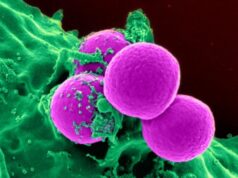A volunteer receives an injection in the PREVAIL Ebola vaccine clinical trial in Liberia.
Credit: PREVAIL
Results from a large randomized, placebo-controlled clinical trial in Liberia show that two candidate Ebola vaccines pose no major safety concerns and can elicit immune responses by one month after initial vaccination that last for at least one year. The findings, published in the October 12 issue of the New England Journal of Medicine, are based on a study of 1,500 adults that began during the West Africa Ebola outbreak. The trial is being conducted by a U.S.-Liberia clinical research collaboration known as the Partnership for Research on Ebola Virus in Liberia (PREVAIL), established in 2014 in response to the request from the Liberian Minister of Health to the U.S. Secretary of Health and Human Services. The trial is sponsored by the National Institute of Allergy and Infectious Diseases (NIAID), part of the National Institutes of Health (NIH) and involves scientists and clinicians from Liberia and the United States.
PREVAIL conducts collaborative biomedical research in accordance with best practices, to advance science, strengthen health policy and practice, and improve the health of people in Liberia and around the world. The partnership launched this first study, PREVAIL 1, in February 2015. Originally designed to enroll 28,000 volunteers, the trial was scaled back to a Phase 2 study when the decline in new Ebola cases made it impossible to conduct a large efficacy study.
“In Liberia, we have demonstrated to the global community that rigorous scientific research can take place in a developing sub-Saharan African country when a mutually beneficial partnership is developed,” noted Dr. Bernice T. Dahn, Liberia’s Minister of Health. “The work of PREVAIL, ranging from the Ebola vaccine to the Ebola survivor studies, clearly manifest the prospects of such a sustainable partnership and clinical research platform.”
The co-leaders of the trial are Stephen B. Kennedy, M.D., M.P.H., senior research scientist at the University of Liberia-Pacific Institute for Research and Evaluation (UL-PIRE) Africa Center, an infectious disease research center; Fatorma Bolay, Ph.D., director, Public Health and Medical Research at the National Public Health Institute of Liberia; and H. Clifford Lane, M.D., NIAID’s clinical director.
The vaccine candidates included cAd3-EBOZ, co-developed by NIAID’s Vaccine Research Center and GlaxoSmithKline (GSK); and rVSV-ZEBOV, which was initially engineered by scientists from the Public Health Agency of Canada and is now licensed to Merck Sharp & Dohme Corp., a subsidiary of Merck & Co., Inc., (Merck). GSK and Merck provided the test vaccines for the study.
From Feb. 2, 2015, through April 30, 2015, the trial rapidly enrolled men and women ages 18 and older with no reported history of Ebola virus disease at Redemption Hospital in Monrovia. Three groups of 500 volunteers received one of the vaccine candidates or a placebo (saline injection). Participants provided blood samples before vaccination and again at one week, one month, six months and one year post-vaccination. Investigators then tested each of these samples for antibodies to the Ebola virus. Responses at one week were modest with both vaccines. However, by one month, 71 percent of cAd3-EBOZ recipients and 84 percent of rVSV-ZEBOV recipients developed an antibody response compared to 3 percent of placebo recipients. At one year, antibody responses were largely maintained in both groups: 64 percent of cAd3-EBOZ recipients and 80 percent of rVSV-ZEBOV recipients had an antibody response compared with seven percent of placebo recipients.
Some participants who received the investigational vaccines experienced mild to moderate side effects that resolved, such as headache, muscle pain, feverishness and fatigue. Overall, investigators did not identify any major safety concerns related to the vaccines. Most of the serious medical issues reported during the trial were due to malaria.
Interestingly, at the beginning of the trial investigators found that 4 percent of participants already had a certain threshold of Ebola antibodies — indicative of past Ebola infection — but no known history of Ebola virus disease. Investigators also found unexpectedly that the proportion of participants developing malaria by one year was lower for participants who received the investigational vaccines as compared with those receiving placebo, particularly among the rVSV-ZEBOV recipients. Future studies are needed to determine if this is a chance finding or if it has some significance related to cross-reactive immunity.
Story Source: Materials provided byUniversity of Chicago Original written by Whitney Clavin.Note: Content may be edited for style and length.
Journal Reference:
Stephen B. Kennedy, Fatorma Bolay, Mark Kieh, Greg Grandits, Moses Badio, Ripley Ballou, Risa Eckes, Mark Feinberg, Dean Follmann, Birgit Grund, Swati Gupta, Lisa Hensley, Elizabeth Higgs, Krisztina Janosko, Melvin Johnson, Francis Kateh, James Logue, Jonathan Marchand, Thomas Monath, Martha Nason, Tolbert Nyenswah, François Roman, Eric Stavale, Julian Wolfson, James D. Neaton, H. Clifford Lane. Phase 2 Placebo-Controlled Trial of Two Vaccines to Prevent Ebola in Liberia. New England Journal of Medicine, 2017; 377 (15): 1438 DOI: 10.1056/NEJMoa1614067











